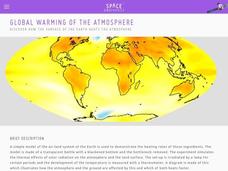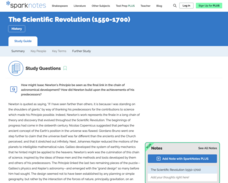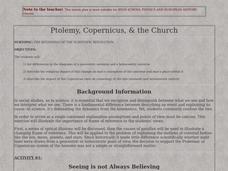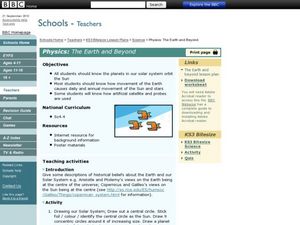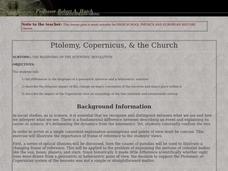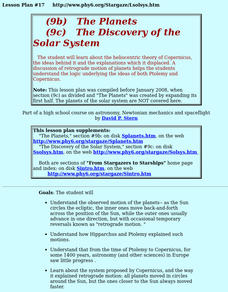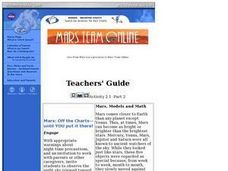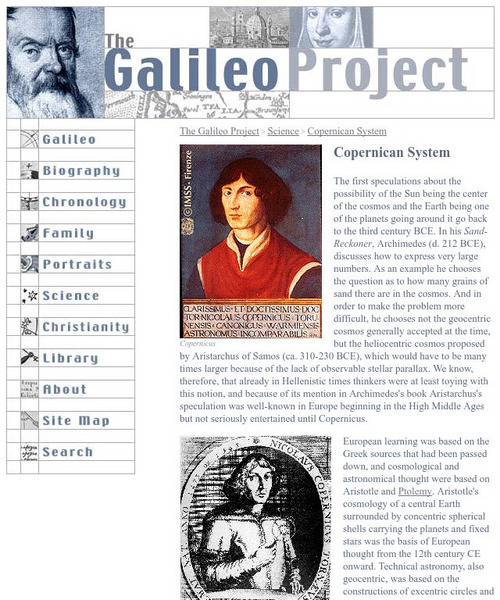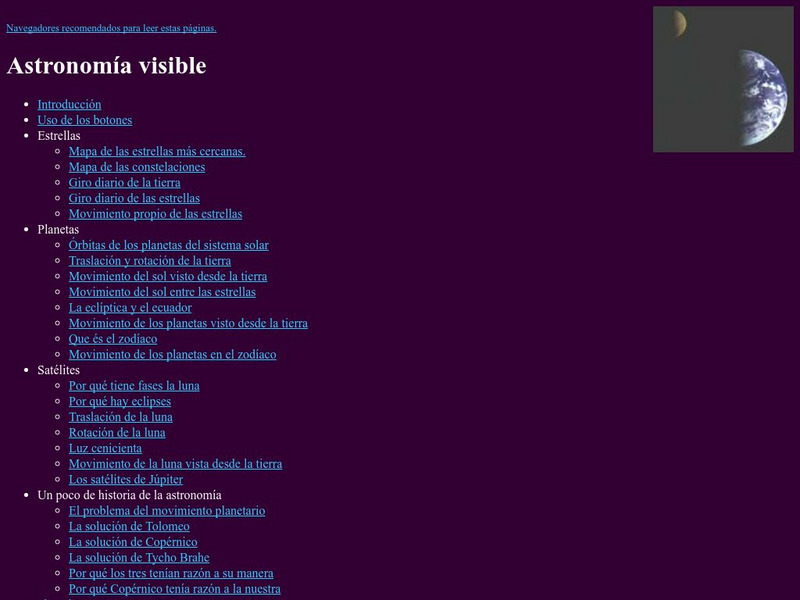Space Awareness
Global Warming of the Atmosphere
Scientists know the amount of carbon dioxide in the atmosphere today is higher than at any point in the last 800,000 years. Scholars learn about the amount of thermic radiation absorbed by air and what happens to the rest of the...
Mr. E. Science
Our Solar System
The presentation starts with the scientists who made discoveries about our solar system: Ptolemy, Copernicus, Galileo, Brahe, Kepler, and Newton. It also covers the planets, inner, outer, and Pluto, satellites, and an in-depth discussion...
Curated OER
Astronomy - Ancient Philosophies
Combine science and social studies with this collection of notes on ancient astronomy. Ideas propagated by early scientists influenced the way people viewed life and our place in the universe. Examine the philosophies of Aristotle,...
Curated OER
The Scientific Revolution: 1500-1700
Discover the key players involved in reshaping scientific thought during the scientific revolution. Basic information regarding major contributions of Brahe, Copernicus, Galileo, Bacon, Kepler, Descartes, and Newton are covered in this...
Spark Notes
The Scientific Revolution (1550-1700): Review Test
In this online interactive history quiz instructional activity, students respond to 45 multiple choice questions about the Scientific Revolution. Students may submit their answers to be scored.
Spark Notes
The Scientific Revolution (1550-1700): Study Questions
For this online interactive history worksheet, students respond to 10 short answer and essay questions about the Scientific Revolution. Students may check some of their answers on the interactive worksheet.
Curated OER
Addition Facts to 20: Copernicus Picture
In this addition facts learning exercise, students solve the 24 addition problems. Students color each problem space with the color indicated in the key. The result is a picture of Copernicus.
Curated OER
The Solar System
In this solar system worksheet, learners will name the two models of the solar system and compare their differences. Students will state the hypothesis behind the formation of the sun and planets. Learners will compare and contrast the...
Curated OER
The Seasons
Discover the change of the seasons by modeling the Earth-Sun system. Learners model the orbit of the Earth around the sun and explore how and why the patterns of winter and summer occur.
Curated OER
Ptolemy, Copernicus, & the Church
Students explore the scientific revolution. In this scientific revolution instructional activity, students complete activities regarding Ptolemy, Copernicus, and the Church.
Curated OER
Physics The Earth and Beyond
Fourth graders will explore our solar system. In this physics lesson students create a model of the solar system to explore the movement of Earth, the Sun, and stars.
Curated OER
People of the Scientific Revolution
In this Scientific Revolution worksheet, pupils read a brief overview of the contributions of Copernicus, Bacon, Kepler, Galileo, Newton, and Harvey.
Curated OER
Ptolemy vs. Copernicus
Students list differences in the diagrams of a geocentric universe and a heliocentric universe. They students describe the religious impact of this change on man's conception of the universe and man's place within it. Students describe...
Curated OER
The Discovery of the Solar System
High schoolers study the ideas behind the heliocentric theory of Copernicus. They examine about retrograde motion of the planets as they move around the sun. They study astronomers who include Ptolemy, Copernicus, and Galileo.
Curated OER
Ptolemy, Copernicus, & the Church
Learners determine the difference between a geocentric universe and a heliocentric universe.
Curated OER
The Discovery Of The Solar System
Learners study the heliocentric theory of Copernicus, the ideas behind it and the explanations which it displaced. A discussion of retrograde motion of planets helps students explain the logic underlying the ideas of both Ptolemy and...
Curated OER
Mars: Off the Charts--Until You Put It There
Students explore the night sky and make illustrations which are shared in class the next day. Distinctions are made between the stars and the planets and views of the constellations for the season are made available. The work of early...
Curated OER
The Discovery of the Solar System
Students explain the observed motion of the planets. The inner ones move back-and-forth across the position of the Sun, while the outer ones usually advance in one direction, but with occasional temporary reversals known as "retrograde...
PBS
Pbs Learning Media: Galileo: Sun Centered System
In the early 1600s, most people believed that the Sun revolved around a stationary Earth. This video segment adapted from NOVA tells how Galileo proved that the Sun, not Earth, is at the center of our universe.
University of St. Andrews (UK)
University of St. Andrews: Francois Viete
The University of St. Andrews offers this iography of Francois Viete. Many links are provided for more information.
Florida State University
Florida State University: Science, Optics & You: Nicolaus Copernicus
Biography of Nicolaus Copernicus (1473-1543), the scientist who first put forward the theory that the Sun was the center of the universe.
Rice University
Galileo Project: The Copernican System
This site from The Galileo Project of Rice University contains information relating to Copernicus's sun-centered solar system theory. Pictures are provided throughout this article along with links to additional information.
Ministerio de Educación (Spain)
Ministerio De Educacion: Astronomia Visible
This site has maps of the nearest stars and constellations. Earth and star daily rotation, proper motion of the stars and many other topics about the solar system are also shown.Read phonetically
Other
University of Zagreb: Nicolaus Copernicus
An interesting biography of Nicolaus Copernicus, the famous astronomer.


